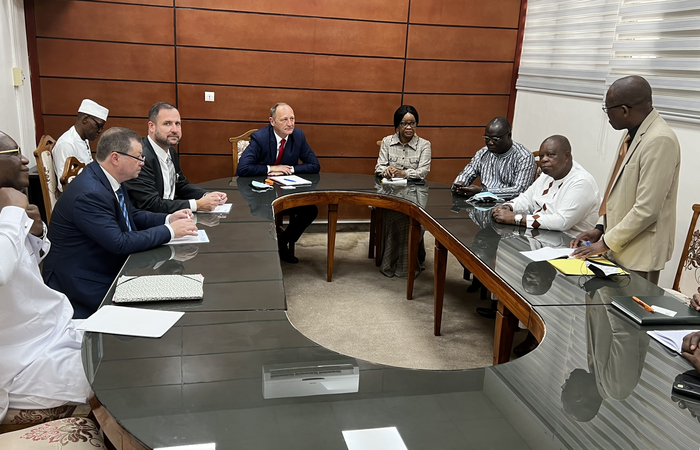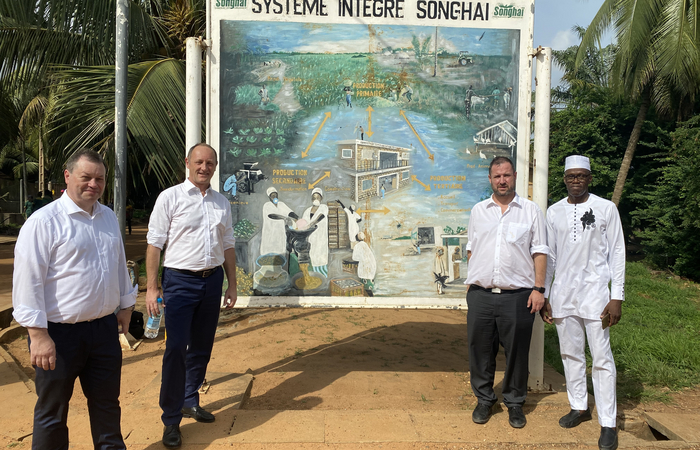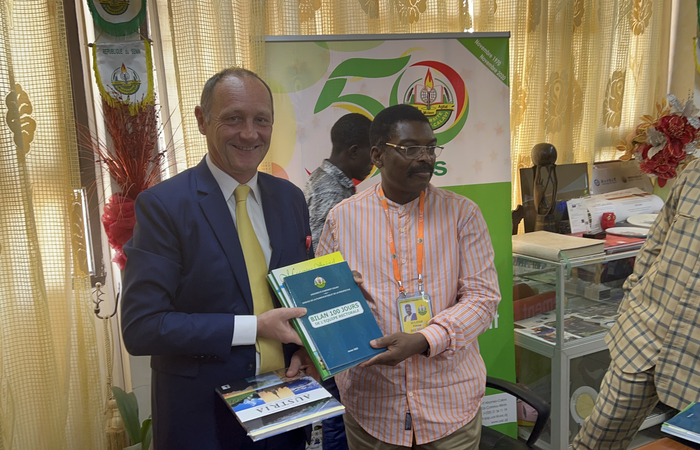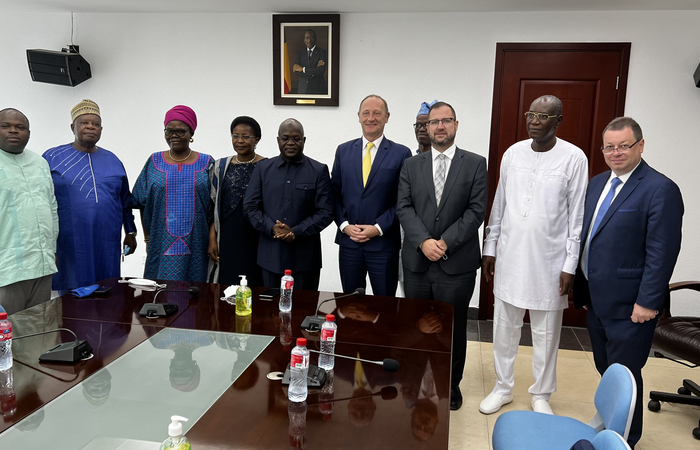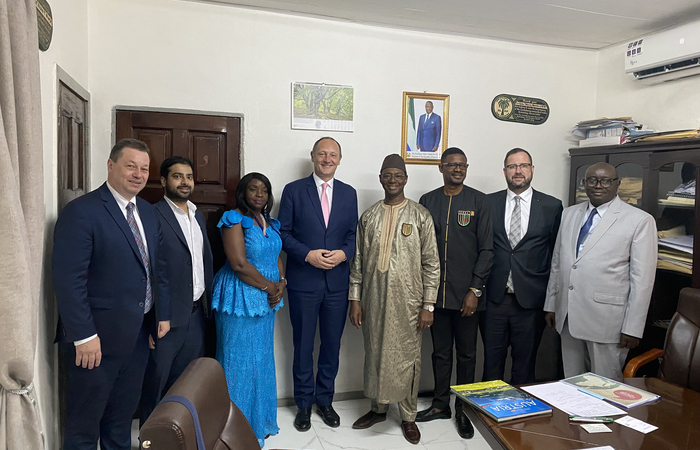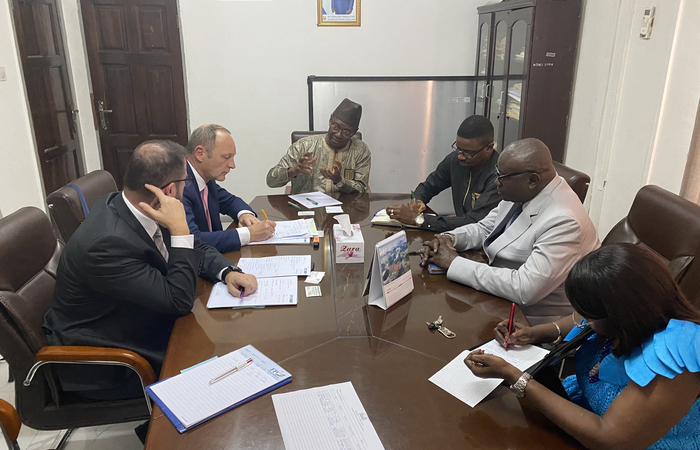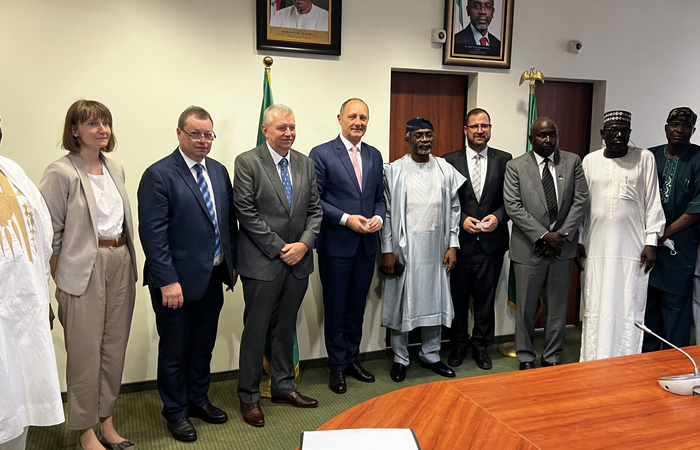Science and Education in Benin, Nigeria and Sierra Leone
Educational Exchange with Africa
From 2 April 2022 to 14 April 2022 the President of the FBI and Member of the National Council Dr Axel Kassegger, together with his fellow member of the National Council Christian Hafenecker (Chairman of the Committee for Research, Innovation and Digitalisation) and the latter’s assistant, the former municipal councillor Berno Mogel, travelled to selected countries in sub-Saharan Africa, namely to Benin, Nigeria and Sierra Leone. The purpose of the trip was to put a special focus on the field of education in the primary, secondary and tertiary sectors, as well as on dual education. This was done through meetings with people in positions of responsibility from parliaments, ministries and universities, as well as with representatives from projects and enterprises that practice dual education with the aim of cultivating contacts and gaining new knowledge.
On Monday 4 April 2022 an intensive working discussion in the capital of Benin Porto Novo was held with members of parliament of the Republic of Benin. The discussion with the MPs Dedevi Eugenie Chantal Ahyi, Florentin Ahohounkpin Tchaou and Etienne Tognigban focused not just on the ever-present war in Ukraine but above all on introducing the education systems in Austria and Benin and explaining their respective challenges. The head of the delegation Dr Kassegger explained how the Austrian system of dual education works as well as the advantages and challenges it entails.
In the afternoon, the delegation visited a very interesting project near Porto Novo. The Songhai Centre, which was founded by a Nigerian in 1998, offers around 22 hectares of space for research facilities and crop land for work on the topic of sustainable agriculture and circular economy. In addition to 250 permanent employees, around 450 students from Benin and neighbouring countries are also trained here.
On the morning of Tuesday 5 April 2022 there was a conference with the Minister of Education Kouaro Yves Chabi and the Minister of Science and Research Eleonore Yayi Ladekan and their cabinet staff at the Ministry of Education in Cotonou. The two ministers explained the basic structure of the Benin education system, which with its two “Siècles” (each lasting three years) after the elementary level is heavily based on the French system. Dr Kassegger and Mr Hafenecker MP in turn explained the Austrian system and in particular the various Austrian research funding instruments. Those attending the conference observed that despite the differences between the countries there are still significant common denominators in terms of the tasks and challenges. In Benin too, issues such as graduate employability, the shortage of skilled workers, the lack of permeability in the education system and high drop-out rates are key problems.
On the afternoon of Tuesday 5 April 2022 a conference with the vice-rectors and representatives of Benin’s four state universities took place on the campus of the Université d’Abomey-Calavi under the direction of the rector of the largest university in Benin, the Université d’Abomey-Calavi, Prof. Felicien Avlessi. The rector, Prof. Felicien Avlessi heads the oldest and largest university in Benin. Founded in 1970 as the Université du Dahomey (named after the former Kingdom of Dahomey), the university was renamed Université d’Abomey-Calavi in 2001 and today has approximately 65,000 students and more than 1,000 professors and teaching staff. Vice Rector Yvette Onibon Doubogan introduced the Université de Parakou, the country’s second-largest university. This was followed by a lively discussion on the permeability of the education system, quality management in the tertiary education sector, sharpening the focus of tertiary education on the needs of the labour market and the impact of the Covid pandemic on teaching activities. In this connection, Dr Kassegger drew attention to the successful Austrian model of universities of applied sciences, which are especially useful in the context of in-service training to achieve the goal of lifelong learning.
On the next leg of the journey to the Federal Republic of Nigeria, a meeting with the Deputy Vice Chancellor of the University of Abuja, Prof. C.B.I. Alawa and other university representatives took place on the morning of Thursday 7 April 2022 at the university’s large new campus which occupies around 10 hectares just outside Abuja. Founded in 1988, the University of Abuja, a state university with approximately 60,000 students, claims it reflects the vast state of Nigeria as students from all 74 regions of the country are enrolled here. The university has numerous partnerships with US, Chinese, Japanese and British universities. Cooperation with universities in German-speaking countries is unfortunately still underdeveloped, according to the Director for International Cooperation Prof. Aisha Sani Maikudi. The University of Abuja is a partner university of the Austrian Afrika-UniNet programme, although it has not yet participated in any of the calls to date. In particular, there is a strong interest in cooperation with agroeconomic universities and universities of veterinary medicine.
On the afternoon of the same day there was a meeting at the Nigerian parliament in Abuja with the Speaker of the House of Representatives the Hon. Femi Gbajabiamila and the Chair of the Foreign Policy Committee Dr Yusuf Buba Yakub. Nigeria’s constitution is heavily based on that of the United States, i.e. the country is a presidential democracy with a two chamber system with a senate and house of representatives. Discussions with the President of the House of Representatives Femi Gbajabiamila focused mainly on security policy and economic policy issues. The war in Ukraine and its impacts on Nigeria, by far the most populous and economically powerful country in west Africa, (ECOWAS) were of particular interest.
On Friday 8 April 2022 the delegation visited three companies with links to Austria that are based in Lagos, the country’s economic centre. Supreme Lace Ltd., which belongs to the Austrian entrepreneur Rudi Bösch, is the last surviving company of the formerly powerful Nigerian textile industry. The owner was able to provide insights into the main challenges of the location (supply chain problems, power supply, infrastructure, financing, competition from China). Primlaks Industries Ltd., an Indian-owned company that produces steel grids and sheet steel, uses a state-of-the-art machine for the production of steel grids made by the Austrian company M+S Maschinen und Stahl Holding GmbH based in Raaba-Grambach in Styria. BAGCO-LAGOS Ltd. employs 1,200 people and is the market leader in the production of woven plastic bags, which are mainly used in the building materials industry. Over 250 of the machines in operation at the plant in Lagos were made by the Lower Austrian company Starlinger & Co. GmbH from Weißenbach an der Triesting. The company also runs its own dual education programme which was presented to the delegation by the head of production Kevin Wernberg.
On the final stop of the trip in Sierra Leone, in-depth talks with the Chair of the Education Committee Bilor Shaw and other Committee members took place on the afternoon of Monday 11 April 2022. The Free Quality Education programme initiated by the current President Julius Maada Bio, who was the candidate of the main opposition party in the 2018 presidential election, ushered in a major change in the entire education system in Sierra Leone. The programme abolished fees for education and made education at all levels (primary, secondary, tertiary) free of charge. As a result of the new strategy, the number of children enrolled in primary and secondary education has tripled, in principle a very positive development but one which has presented the ministry of education with problems that seem insoluble. As well as a lack of resources for infrastructure there is especially a shortage of teaching staff. Bilor Shaw reported that although 22% of Sierra Leone’s total budget is spent on education, this is well below what is needed and the country is highly dependent on international support. In rural areas in particular, it is very difficult to find suitable teachers and efforts are therefore being made to intensify teacher training and make rural areas more attractive. The school feeding programmes, which guarantee that children in rural areas get at least one meal a day, is a positive development in terms of the overall situation. The day’s itinerary also included a visit to the Safer Future Youth Development Programme in Freetown, where the programme director Idriss Sahid Kamara introduced the project that was launched in 1993. It includes apprentice training schemes in the fields of catering, tailoring, carpentry, hairdressing and construction as well as a Junior Secondary School. To date more than 1,000 young people have undergone apprentice training there and more than 500 pupils currently attend the school, which due to the infrastructural deficits is run in two shifts.
On the afternoon of Tuesday 12 April 2022 the delegation first of all met the Republic of Sierra Leone’s Minister of Science, Prof. Alpha Tejan Wurie. In contrast to Austria, the ministries for education and science in Sierra Leone were split up again in 2018 so that there are currently two ministries. Prof. Wurie explained his country’s tertiary education system. There are a total of six state universities and a host of private educational establishments, none of which, however, have been recognised as universities. As well as the chronic lack of resources, the Minister of Science considers the greatest challenges for Sierra Leone to be the further development of the agroeconomic sector, implementation of university-standard skills-based technical education programmes, the creation of a framework for functioning digitalisation by expanding networks and supplying students with hardware, and promoting teacher training through teacher training academies. Dr Kassegger and Mr Hafenecker MP then introduced the Austrian higher education system making special reference to the universities of applied sciences and the Austrian system of research funding; they also drew attention to the Austrian Afrika-UniNet programme.
At a further appointment in the afternoon there was a meeting with the Vice-Chancellor of the University of Sierra Leone and Head of the Institute of Public Administration and Management (IPAM) Prof. Foday Sahr. The University of Sierra Leone (USL) can look back on a proud history as the oldest university in Black Africa and had its origins in Fourah Bay College founded in 1827. In the past, the faculties of Theology and Education in particular contributed to Freetown’s reputation as the “Athens of West Africa”.
